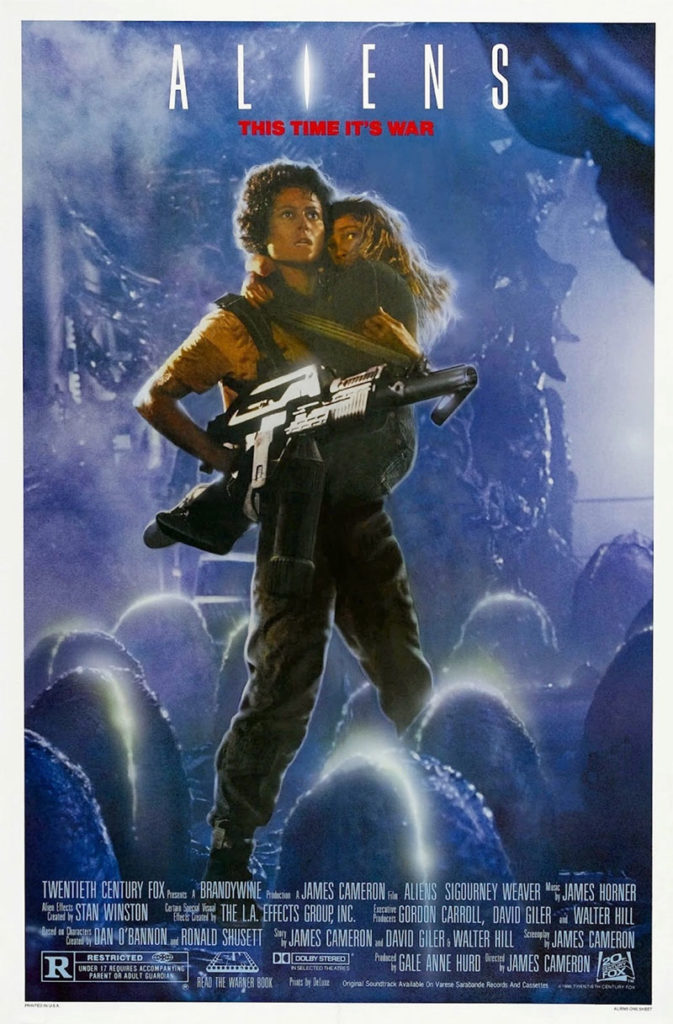 Alien is an artful film. It is frightening and suspenseful, but it also has operatic grace and gritty realism, despite being set mostly aboard a spaceship. It’s hard to imagine Alien spawning a sequel so tonally different yet still so successful, but Aliens does just that. The two films are poles apart, sharing with each other only the alien creatures and Sigourney Weaver, who reprises her role from the first film as Ripley.
Alien is an artful film. It is frightening and suspenseful, but it also has operatic grace and gritty realism, despite being set mostly aboard a spaceship. It’s hard to imagine Alien spawning a sequel so tonally different yet still so successful, but Aliens does just that. The two films are poles apart, sharing with each other only the alien creatures and Sigourney Weaver, who reprises her role from the first film as Ripley.
Many sequels born of successful films are flawed from the start, attempting to recreate the magic of the first film by simply imitating it. For example, Jaws 2 tried its damnedest to cash in on its progenitor’s success, but it was little more than a rehash of the same story with a less robust script, a less talented director, and a lame attempt at topping the original’s explosive climax. More examples abound, including Rocky and Rocky 2, King Kong and Son of Kong, along with many others.
Aliens director and screenwriter James Cameron was surely aware of film history and the perils of trying to recreate a successful formula when he conceived the project. His solution appears to have come about by asking some simple questions about Alien. Why didn’t the protagonists just shoot the alien? What would happen if there were more than one alien? Cameron apparently decided that a successful sequel could be made while adhering to conceptual precedent by arming the humans in his film with machine guns, flamethrowers, and grenade launchers. Since heroes bristling with such weaponry would make quick work of one alien, Cameron supplies dozens.
What made it to the screen is a battle royale between aliens and space marines that continues to quicken after the first shot is fired (it takes the better part of an hour to move from setup to action, a long time, but none of it is wasted). A copious amount of twists and turns prevents the viewer from having many moments to exhale, but none of these contortions are any more over the top than the rest of the film. Even the finale, after the viewer has already endured an endless amount of alien onslaught, becomes plausible enough to avoid eye rolling.
Alien relied on a deliberate pace thick with tension, punctuated by quick and deadly strikes by the monster. Aliens never tries to establish a normal pace that becomes disrupted by a monster’s shocking, unexpected manifestation. After they show up, the aliens have too much screen time for that. Instead, Aliens consists of sequences of battle and sequences preparing for battle, making its pacing more akin to modern war movies than horror films. Consequently, while it is effective at widening a viewer’s eyes, there aren’t any spots from the audience’s point of view where the aliens make unscheduled appearances. But that’s okay.
Aliens is a fast-paced action film, but it is not dumb. It has no subtlety, and suffers nothing for it. It’s not as pretty s its predecessor, nor is it ugly. The environment Cameron creates is distinctly his own. Look closely and one can see where he stretched the budget. Early on, two of the characters are lugging MG-42s, machine guns once used by the Wehrmacht during World War II, tricked out and obscured just enough to look like a weapon from the future. The armored personnel carrier used by the marines is a towing vehicle commonly seen at airports. The drop ship looks as if it was made from a model kit for a Vietnam-era Cobra gunship. Peel back a few layers on the alien costumes, and who knows what’s in there. The film doesn’t look expensive, but it doesn’t look cheap, either.
There is a special edition of the film that includes an additional seventeen minutes of footage. The deleted scenes where life is shown in the colony before alien infestation are interesting artifacts. The extended cuts of previously released scenes show that sometimes its better to stick with the theatrical cut, but one extended scene, showing automated guns repulsing a pair of alien attacks, works so well in adding to the desperate plight of the protagonists that it is a welcome addition.
Aliens compares favorably with its predecessor because it is such a fundamentally different film. Other than the alien and Ripley, it relies on so little from the first film that it hardly feels like a sequel at all. Aliens is a science fiction ode to destruction and chaos. It rarely slows once it gets going, every confrontation becoming more desperate and spectacular as the minutes go by. This method of making films is more common today (usually doing away with setup time, and any subtlety) than it was when Aliens was released, but this film remains strong.
